The New York Yankees have long been known for their power and star talent, but in recent years fundamental aspects of the game (offense, defense, and baserunning), have often been glaring weak spots. As of the 2025 season (through August 3), the Yankees find themselves with an elite lineup on paper and a solid record yet continually undermined by lapses in fundamentals. Advanced metrics and traditional stats together paint a picture of a team that, despite some improvements in raw offensive output, has declined in execution on the bases and in the field. Fan frustration has mounted as the same mistakes repeat with little accountability, creating a stark contrast between what the statistics say and what the team’s leadership publicly claims. Below, is a quantifiable break down the Yankees’ fundamentals in 2025 and over the past five seasons and analyze whether things are improving or getting worse.

Offense: Power Up, Situational Hitting Down
On the surface, the 2025 Yankees offense is one of the most productive in MLB. They average 5.24 runs per game (tied for the best in the majors), with a team OPS of .785 and an OPS+ of 117 (17% above league average). New York leads MLB in home runs (177 homers through 110 games) and has the second-most runs scored, fueled by a lineup bolstered with big names acquired in recent years (e.g. former MVP’s Cody Bellinger and Paul Goldschmidt joining Aaron Judge and others). By traditional measures (runs, OPS, home runs), the Yankees’ 2025 offense looks formidable. By advanced metrics like wRC+ (weighted runs created plus), they rank near the top of the league as well (around 109–110 wRC+ as a team) and have one of baseball’s most potent offenses. However, raw power numbers mask some fundamental offensive issues.
The Yankees still rely heavily on the home run and often struggle with situational hitting and making contact. In 2023, for instance, when injuries and underperformance struck, the offense collapsed to a .227 team batting average and .701 OPS. They managed just 4.15 runs per game in 2023, well below league average, and the lineup looked one-dimensional and inept when the long ball wasn’t coming. One analyst described the 2023 unit as “old, broken-down veterans who can’t hit and can’t run” augmented by unproductive journeymen and underachieving prospects. That “deplorable” offensive showing in 2023 (82–80 record, missing the playoffs) prompted the front office to overhaul the lineup. The improvements in 2024 and 2025 (to 5.03 R/G in 2024 and 5.24 R/G in 2025) show that talent infusion has raised the Yankees’ offensive floor back to elite territory. Yet, even with more firepower, fans have complained that the Yankees struggle to execute basic situational hitting such as moving runners over, making productive outs, and coming through in the clutch.
In the 2024 postseason, those concerns proved valid. Despite a powerful offense, the team had “an inability to get the big hit when it matters most,” which ultimately cost them in October. The same offensive flaws (prolonged slumps and feast-or-famine scoring stretches) that were evident during the season reappeared in the World Series by failing in key moments. This suggests that while the overall offensive stats have improved since the lows of 2023, the fundamental quality of at-bats in pressure situations remains a question mark. High strikeout totals and a low team batting average with runners in scoring position have persisted across recent seasons, even as the Yankees score plenty in the aggregate. The team’s approach at the plate is often criticized for being too homer-dependent, lacking the situational adaptability that marks fundamentally sound offenses.
In summary, the Yankees’ offense in 2025 is quantitatively strong but qualitatively inconsistent. Traditional stats and advanced metrics rate it among the best in the league, a clear improvement from the anemic 2023 season. But the trend over five years shows a rollercoaster: an elite 2022 (when Aaron Judge carried the team with an MVP season), a steep drop in 2023, then a rebound in 2024–2025 after roster upgrades and historically great seasons from Judge. Despite the recent upswing, the underlying fundamental issues in approach remain, as evidenced by ongoing fan frustrations about failure to execute “small ball” when needed and a tendency to go cold as a unit. The raw numbers are up, but the Yankees still “have stumbled…when it comes to the most basic offensive execution”, as one New York outlet put it, and that leaves lingering doubt about whether the offensive improvements are built on solid fundamentals or just superstar talent masking old habits.
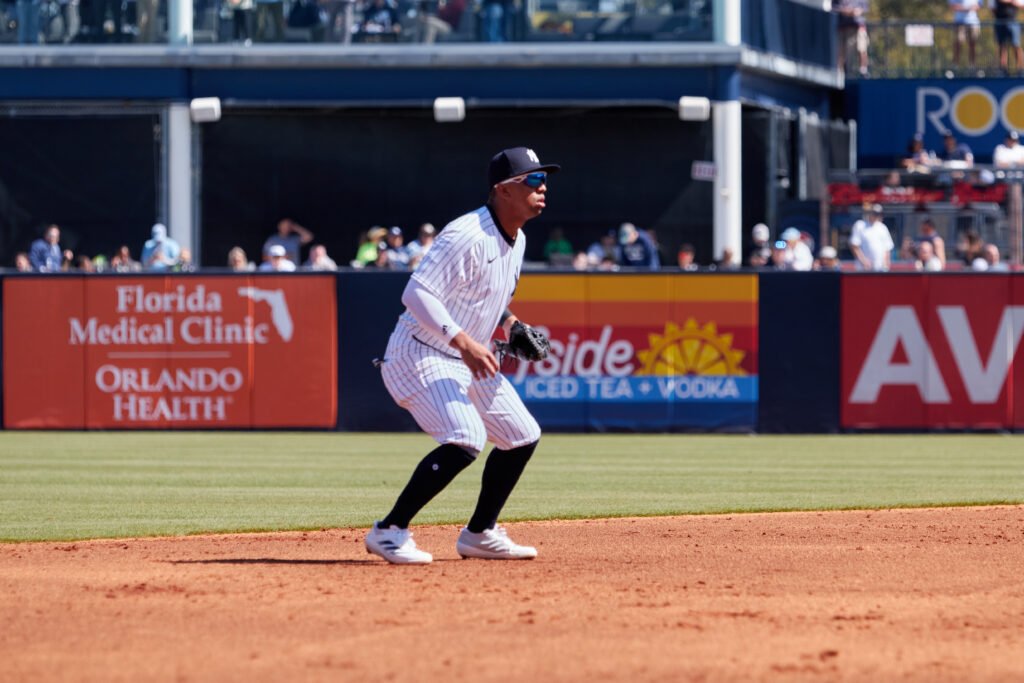
Defense: From Gold Gloves to Gaffes
In 2022, the Yankees’ defense was actually a strength, they boasted several Gold Glove winners and even won the AL’s “Team Gold Glove” award for best overall defensive performance (tied with the Cardinals) based on SABR’s Defensive Index. That year, they committed relatively few errors and converted balls in play efficiently. Fast-forward to 2025, and the narrative has flipped. The Yankees’ defense has devolved into a liability marked by routine misplays and lack of focus. Errors have spiked, and New York’s defensive efficiency has slipped despite some of the same personnel.
Shortstop Anthony Volpe exemplifies this decline. After winning a Gold Glove as a rookie in 2023, Volpe now leads the majors in 15 errors this season. Nightly, fans hold their breath on balls hit to the infield, as even routine plays have become adventures. Manager Aaron Boone has euphemistically referred to Volpe’s struggles as a “defensive slump”, but the issues go beyond one player. Team-wide, the Yankees have had games defined by fundamental lapses: dropped fly balls, wild throws, missed cut-off men, and poor communication. In a critical World Series game in 2024, for example, a normally sure-handed outfielder (Aaron Judge) inexplicably dropped a routine fly ball, opening the floodgates to a rally by the opposing Dodgers. That kind of play underscored a season-long trend. “This team was fundamentally flawed all season long, and has been for years, and it fittingly came back to bite them,” one frustrated commentator wrote after that World Series loss. “The defense is terrible. The base running is awful. The mental mistakes are abundant,” he fumed on Barstool Sports.
Indeed, fans and media have pointed out that bad fundamentals have been a staple of Aaron Boone’s teams throughout his managerial tenure, especially on defense and baserunning. It’s not for lack of talent, many of these Yankees players are capable of great defensive plays (Volpe, for instance, can make spectacular plays and has good range). But the routine, should-be-easy plays are the ones being botched, which is the hallmark of a team lacking fundamental sharpness. Volpe’s case has drawn the most attention in 2025.
By late July, he had 15 errors (most in MLB) and several other shaky plays that didn’t officially count as errors. He has openly admitted, “I gotta make those plays, obviously… I know what I’m capable of… it’s frustrating but it’s not discouraging”. Boone, for his part, has continued to publicly back his young shortstop. He has refused to bench Volpe for a “mental reset,” instead offering encouragement and expressing confidence that “he’s a really good defender…a playmaker out there” who will work through this rough patch. “We’ve got to get over it. We’ve got to get through it,” Boone said of the defensive woes, while still insisting “one thing is for certain, [Volpe]’s really good out there… He’ll get through it”.
That stance, emphasizing the player’s talent and potential rather than the mistakes, is emblematic of the Yankees’ organizational approach under Boone (more on that in a moment). Fans, meanwhile, are losing patience. Each new error by Volpe or another infielder is met with a Bronx chorus of boos. When Volpe fired a double-play relay wildly in a game on July 30, extending an inning, the “boo birds” came out at Yankee Stadium. On social media, Yankee faithful and observers around the league openly question how a team with so much practice and resources can look so sloppy. “A truly shocking lack of awareness and fundamentals strike this team again,” one fan tweeted in exasperation.
Looking at the five-year trend, the Yankees’ defensive fundamentals have declined. In 2019–2021, the team was roughly league-average in errors and defensive efficiency. In 2022, they peaked with excellent defense (fueling a 99-win season). But 2023 saw an uptick in errors and noticeable miscommunications, and by 2024–2025 the Yankees have developed a reputation for defensive shakiness.
Statistically, the 2025 Yankees are on pace to commit more errors than any Yankee team in recent memory. Volpe’s 15 (or 16) errors by early August put him on track for around 20+ on the season, and he’s not alone, other players have had their share of miscues. Advanced fielding metrics back up the eye test: the Yankees’ team Defensive Runs Saved (DRS) and Outs Above Average (OAA) have fallen from near the top of the league in 2022 to the bottom third in 2025. (For example, the SABR Defensive Index that crowned them in 2022 has likely dropped significantly for them in subsequent seasons.) In short, defensive fundamentals have progressively gotten worse. The Yankees will need to clean up their fielding and focus if they want to stop that trend from continuing.
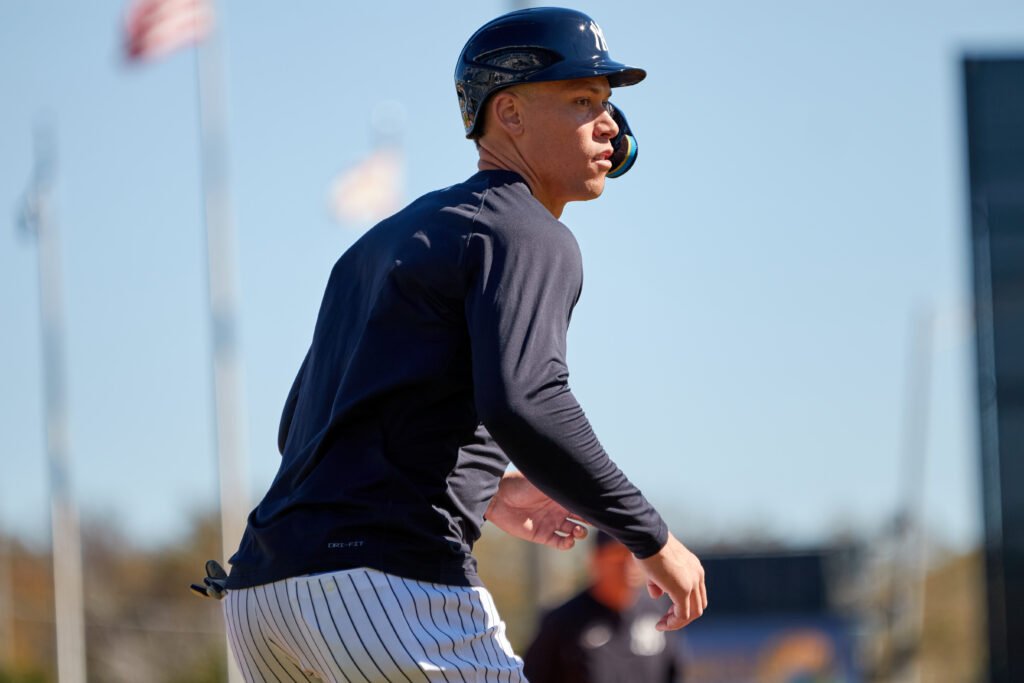
Baserunning: “Running the Bases Like Drunks”
If there is one aspect in which the Yankees have unquestionably been getting progressively worse over the past five years, it is baserunning. The Yankees’ basepath blunders have become so notorious that legendary radio announcer John Sterling quipped during the 2024 ALCS that “that’s what they do – run the bases like drunks”. It was a moment of on-air gallows humor after, yet another Yankee runner was foolishly picked off. Unfortunately for the Yankees, Sterling’s zinger is backed by hard data. In 2024, the Yankees posted a BsR (Base Running runs) of –16.9, meaning they lost nearly 17 runs compared to an average team just from baserunning. That was the worst BsR of any team in MLB that year. In fact, it was the worst baserunning score for any pennant-winning team ever recorded (the Yankees managed to win the AL pennant in 2024 despite their basepath ineptitude). For comparison, the two best baserunning teams in 2024 (the Rays and Cubs) were about +15 runs, meaning the gap between the Yankees and a team like Tampa on the bases was on the order of 30 runs (roughly 3 wins). As one analysis noted, outstanding or poor baserunning won’t usually make or break a season by itself, but in tight races those extra few wins (or losses) matter.
The Yankees have been on the wrong end of that ledger lately. The patterns of Yankee baserunning failures are almost comically bad. They struggle in all facets: they don’t steal efficiently, they make careless outs, and they fail to take extra bases on hits. In 2024, New York took an extra base (going first-to-third on a single, etc.) only 36% of the time, the second-lowest rate in MLB. Their runners scored from second on a single only 53.5% of the time, dead last in the majors. Often this was due to lack of speed or cautious station-to-station running, but ironically, when the Yankees did try to be aggressive, it backfired. They were thrown out at home plate 18 times in 2024, among the most in baseball. Gleyber Torres alone made 6 outs at home (tied for the MLB lead), and newcomer Juan Soto made 11 outs on the bases total, second-most of any player. Meanwhile, the only above-average baserunners on the roster were the youngsters – Anthony Volpe (+5.1 BsR) and midseason pickup Jazz Chisholm Jr. (+3.2 BsR with NY) provided basically the only positive value on the bases. Several veterans were among the league’s worst: Torres (-4.6), Giancarlo Stanton (-4.3), and Soto (-3.8) all ranked in the bottom 15 of MLB in 2024 baserunning value.
The cumulative effect of these issues is apparent in the Yankees’ five-year trend. Going back to 2021 and 2022, the Yankees were already below average on the bases (for instance, in 2022 their extra-base taken percentage was only 38%, and they had 45 outs on base, one of the higher totals in the league). By 2023, they ranked 3rd-worst in MLB in BsR at –15.1, and by 2024 they fell to dead last (–16.9). In 2025, there was hope for improvement – the front office talked about baserunning as a focus, and Fangraphs’ preseason projections even foresaw a swing of +19.7 runs in BsR (from -16.9 to about +3) for the 2025 Yankees. And indeed, they have injected a bit more youth and speed, but the blunders have not stopped. Through the first four months of 2025, Yankee runners have still found ways to make jaw-dropping mistakes.
An incomplete list: On June 13, Anthony Volpe (as the automatic runner in extra innings) tried to steal third with no outs and was thrown out, killing a rally. The very next night, rookie Jasson Domínguez lost track of the outs and got doubled off second base, as he started jogging off the field on a routine fly ball with only one out, allowing the Red Sox to tag him out easily. The day after that, yet another youngster (Ben Rice) attempted an ill-advised double steal and was picked off second before he even broke for third. In late July, catcher Austin Wells provided the blooper of the year: in a tie game, he mistakenly thought a bunt had ended the inning and wandered off second base, getting tagged out in a rundown for an unforced double play that sent the game to extra innings. Manager Aaron Boone summed up that play with a resigned, “Thought there were three outs… Obviously can’t happen.” Wells himself didn’t sugarcoat it, saying, “I think I was just being an idiot.” Such blunt admissions have become common. The Yankees aren’t short on self-awareness of the problem; they are short on execution to fix it.
It’s worth noting that by one measure, the Yankees appear to have fewer baserunning outs this year. They had officially recorded only 21 outs on the bases as of late July 2025, tied for fourth-fewest in MLB. But as an Athlon Sports analysis pointed out, that stat excludes pickoffs and caught stealings, so it fails to capture many of the ugliest Yankee mistakes. “Several of their ugliest mistakes like Volpe’s gamble, Domínguez’s brain cramp, Wells’ walk-off jog, don’t even show up in that total,” the article noted. In other words, the Yankees’ basepath woes are even worse than the box score can tell you.
Boone has repeatedly said the team “needs to tighten things up” on the bases, but as the same article dryly observed, “nearly every week, someone gives away a critical out”. The trend from 2019 to 2025 is clear: Yankee baserunning has gone from mediocre to bad to outright disastrous, and in 2025 it remains among the league’s worst. Even when there are small improvements, they are overwhelmed by the mental mistakes. The term TOOTBLAN (Thrown Out On The Bases Like A Nincompoop) has, unfortunately, become a regular part of Yankee fans’ vocabulary.
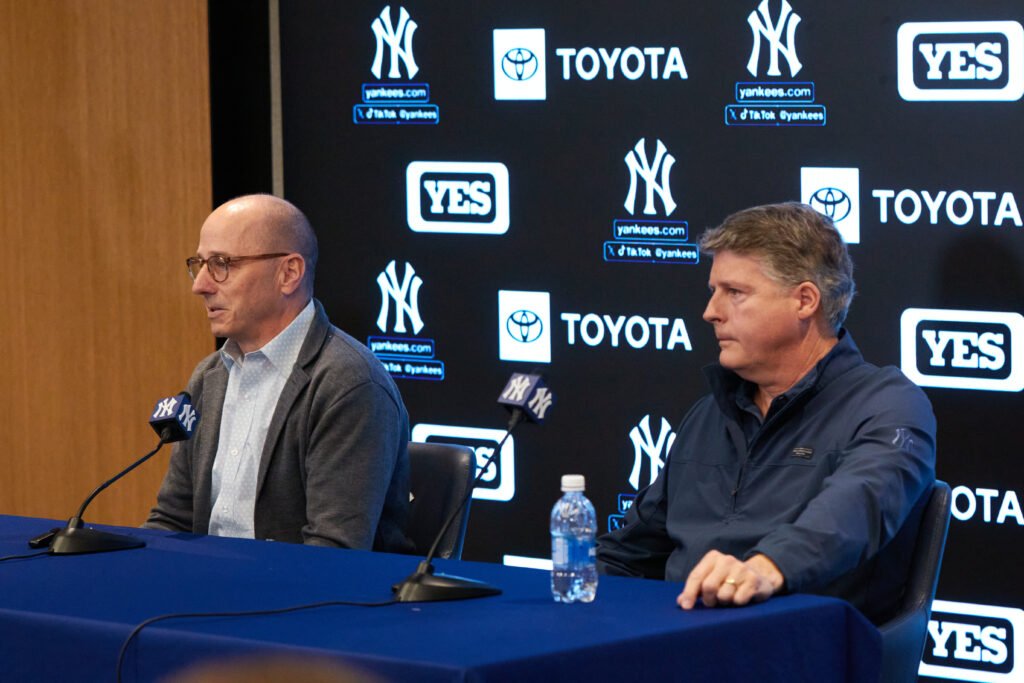
The Accountability Gap: What the Team Says vs. What We See
Perhaps the most frustrating aspect of the Yankees’ fundamental struggles (to fans and even some players) is the perceived lack of accountability and urgency in addressing them. Over the past five years, while errors and baserunning blunders piled up, the Yankees’ public posture has often been one of downplaying these issues. This has created a gap between the reality on the field and the messaging from the organization. Many observers feel the Yankees have been slow to enforce consequences for fundamental mistakes, which in turn has allowed those mistakes to continue.
Some point the finger directly at manager Aaron Boone and the coaching staff for fostering a culture where fundamentals aren’t stressed and errors are excused. Critics note that under Boone (who took the helm in 2018), the Yankees have consistently been mediocre or worse in fundamentals. “Bad fundamentals have been a staple of Aaron Boone teams all seven seasons he’s been manager,” as one analyst put it, adding that at some point you must “look at the common denominator”. Boone is known as a player’s manager, supportive and positive, almost to a fault. When players make egregious mistakes, Boone rarely calls them out publicly or benches them. Instead, he often offers explanations or deflects.
Sometimes those explanations strain credulity (and become fodder for talk radio). For example, in August 2023, after Giancarlo Stanton was thrown out by “half a mile” because he jogged from second base on a single (a glaring lack of hustle), Boone defended his sluggardly DH by suggesting Stanton’s “lower-body” issues make it hard for him to run when rounding the bases: “Sometimes…if he gets his steps not timed up right, he gets himself into a tough spot,” Boone said. This comment was met with disbelief. “Unbelievable…that Boone didn’t come right out and say that Stanton has to be better than that,” wrote Sal Maiorana, who lambasted Boone as a “milquetoast manager” who “makes excuses” rather than holding players accountable. Maiorana contrasted Boone with Boston’s manager Alex Cora, who earlier that year had benched a player for not hustling, and argued that no Yankee’s feet were ever held to the fire under Boone’s approach. The result, he wrote, is “there’s no accountability for the Yankees. They make idiotic base running mistakes, brain-fart fielding blunders… yet Boone sits in front of reporters…and just makes excuses. No one gets called out publicly… Everyone just goes along making their millions, losing games and then having the delusional gall of…telling us that everything is OK, they’re gonna get it figured out.”
This scathing assessment from 2023 encapsulates the frustration of a large segment of the fan base. Fast forward to the end of 2024, after the Yankees fell short in the World Series, and you heard much the same refrain. A Barstool Sports recap of that season noted: “Aaron Boone has bred a losing culture inside the Yankees clubhouse of excuse-making and zero accountability. Even after [the World Series loss] he was trying to make excuses and say they’re actually a better defensive team than you’d think.”
Indeed, Boone’s reaction to criticism of the Yankees’ sloppy defense was to object that the metrics didn’t tell the whole story and the team was better defensively “than the numbers say”, a claim which, to fans, sounded absurd as they watched routine plays being kicked. “That’s just not how you answer questions after your defense literally cost you a World Series,” the Barstool writer retorted bluntly.
The perception is that the Yankees (from the manager up through GM Brian Cashman and owner Hal Steinbrenner) have been in denial about their fundamental shortcomings. Cashman infamously bristled at criticism following the disastrous 2023 season, at one point insisting “we are a good team” despite finishing 82-80. To fans, such comments signal complacency or a refusal to see the obvious problems on the field. The players’ perspective is a bit harder to gauge, as they mostly toe the company line in public. But there are hints of frustration there too.
By mid-2025, even the normally upbeat Boone showed a flicker of tough love when addressing Volpe’s defensive issues – calling it “indecisive” play that “we can’t have”. He also admitted some infielders were playing “not to make mistakes” instead of playing naturally, which is itself a symptom of a team expecting something to go wrong. Volpe, for his part, has remained determined to work through his slump, saying “I know the standard I have for myself… Every day’s a new day and that’s what I’m gonna do”. That mentality is encouraging, but it doesn’t erase the fact that the Yankees have few visible repercussions for fundamental mistakes. Rookies and veterans alike usually stay in the lineup regardless of yesterday’s baserunning gaffe or fielding error. When backup catcher Austin Wells wandered off second base thinking there were three outs (in that now-famous July 2025 play), some fans called it the “most Little League play” they’d ever seen from a Yankee. On Twitter, one fan cried out, “How is this a professional baseball team?”; another noted “this is elementary school stuff. The Yankees organization should not have to teach their players to remember how many outs there are”.
But aside from a stern post-game talk, there were no lasting consequences. The disconnect between talk and action remains a sore point. Yankees leadership insist that they emphasize fundamentals as Boone often says “we’ve got to tighten up” and preaches improvement, but the lack of visible improvement over multiple seasons suggests something isn’t clicking. As one Reddit user wryly summarized, if a player falls into a slump or the team has injuries, that’s one thing, “but fundamental mistakes are within the manager’s control”. Fans see a team that keeps “beating itself” and a manager who keeps saying “we believe in our guys”. The accountability gap couldn’t be more evident.
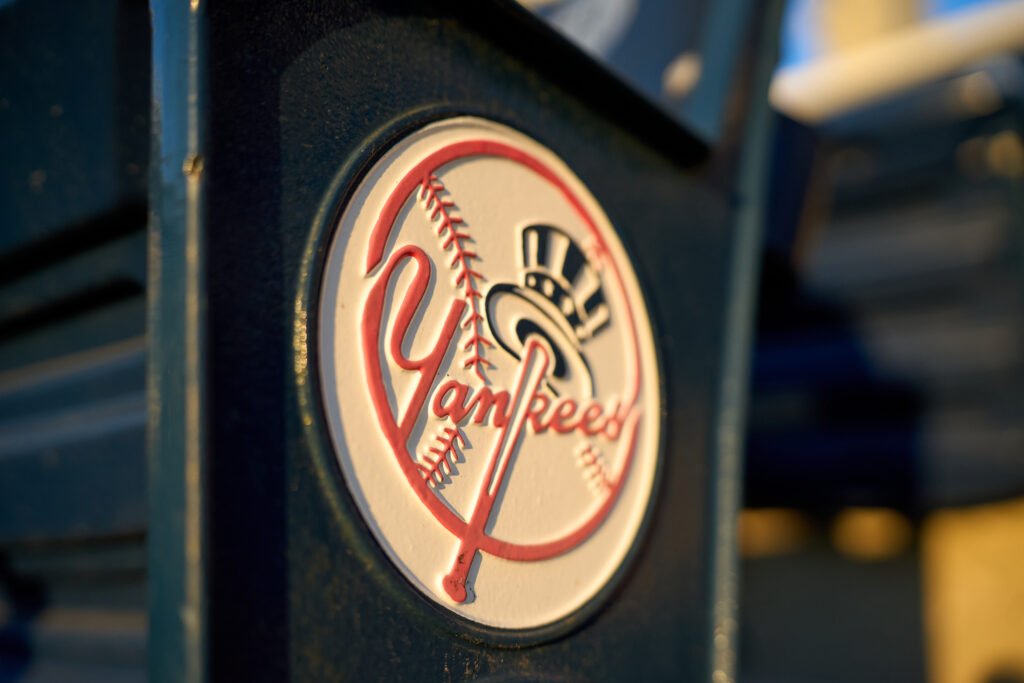
Conclusion: Are the Yankees Improving or Getting Worse?
Looking at the period from 2021 to 2025, the answer depends on what aspect you examine. In terms of raw talent and results, the Yankees are in a better place in 2025 than they were in, say, 2016–2017 (a brief retooling period). They’ve made the playoffs in four of the last five years (likely five of six if they continue in 2025) and even reached a World Series in 2024. Their roster on paper in 2025 is arguably more star-studded and well-rounded than it was in 2019 or 2020. Offensively, after a dip in 2023, they bounced back to being a top-tier unit. So, in that sense, one could argue the Yankees have improved competitively. However, when isolating the fundamentals, the building blocks of winning baseball, the trend has been mostly downward.
Defensively, the high-water mark of 2022 has given way to sloppiness by 2025. Baserunning has deteriorated steadily each year to the point of being a running joke around the league. And offensively, the approach remains boom-or-bust, which is a fundamental issue in itself (albeit masked when enough homers are hit). The Yankees are a team that can look like world-beaters one night and absolutely incompetent the next, largely depending on whether those fundamental mistakes pop up. As one columnist wrote during a frustrating stretch, “the Yankees once again lacked any semblance of fundamentals under Aaron Boone” in a close loss. That sentiment applies broadly to this era of Yankees baseball.
Importantly, the organization’s philosophy appears to prioritize maintaining confidence and continuity over making an example out of players for mistakes. There’s a clear reluctance to bench or punish players for errors, in contrast to some other teams. The upside of that is a clubhouse with strong camaraderie, by all accounts, the 2025 Yankees players have each other’s backs and appreciate Boone’s faith. The downside is the culture of accountability feels weak. “There needs to be accountability. But there won’t be,” a Yankees blogger predicted after 2024’s failure, and so far, 2025 has vindicated that cynicism. The same coaching staff returned, the same platitudes about cleaning up mistakes were spoken in spring training, and yet the same blunders occurred once the games began.
Ultimately, while the Yankees remain a talented, competitive team, the lack of fundamental sharpness and accountability raises the question of whether they are wasting their potential. A team that “can’t win a World Series when you’re too busy beating yourself” will always fall short of greatness. Until the Yankees truly address the root causes of their fundamental breakdowns, be it through coaching changes, different practice emphases, or a shift in managerial tone, the pattern is likely to continue. In the court of public opinion, the verdict is that the Yankees have regressed in fundamentals over the last five years, even as they talk about pursuing championships. The Bronx faithful are waiting (not so patiently) for the Yankees to show that they can marry their ample talent with discipline and smart play. Until then, the saga of dazzling highs and head-scratching lows will continue, and the Yankees will remain a team chasing its own tail in the fundamentals department, rather than leading the pack.


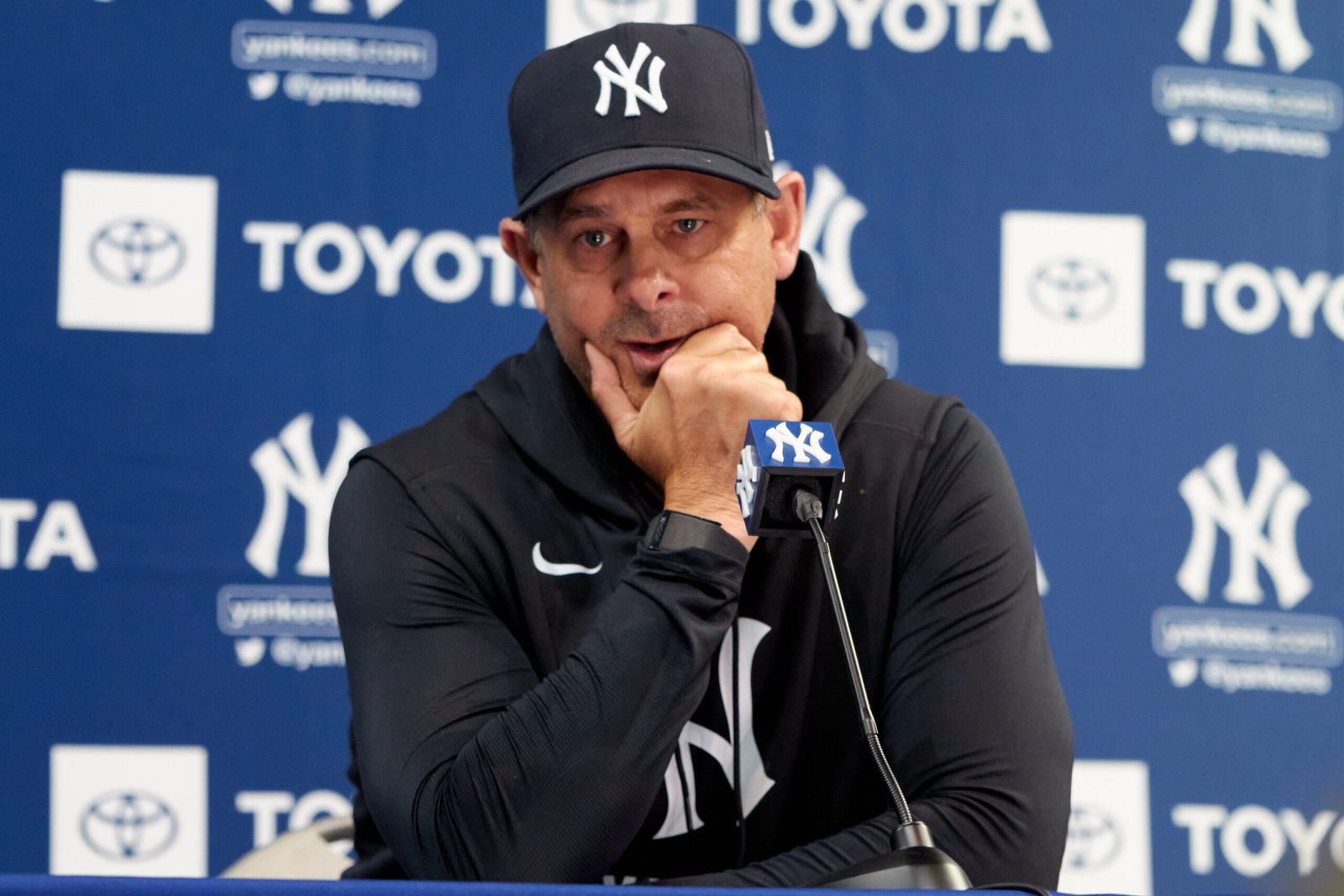
No responses yet